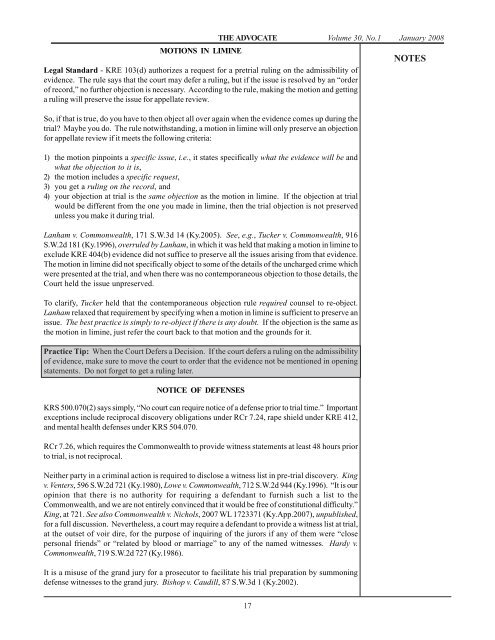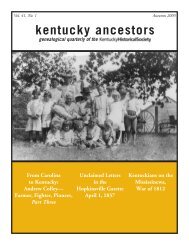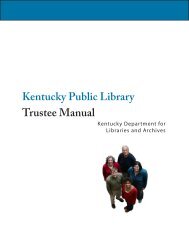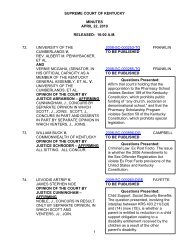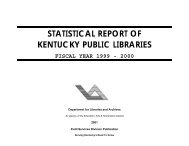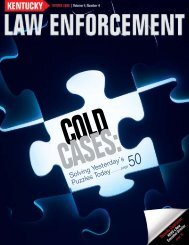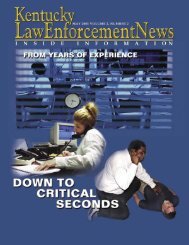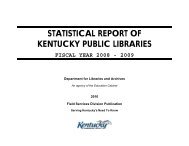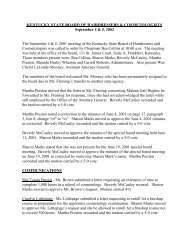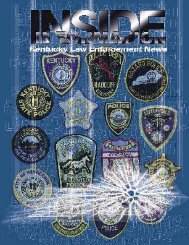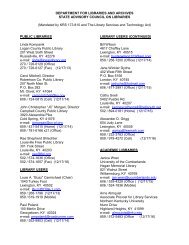Jan08 Advo.pmd - e-archives Home
Jan08 Advo.pmd - e-archives Home
Jan08 Advo.pmd - e-archives Home
You also want an ePaper? Increase the reach of your titles
YUMPU automatically turns print PDFs into web optimized ePapers that Google loves.
MOTIONS IN LIMINE<br />
THE ADVOCATE Volume 30, No.1 January 2008<br />
Legal Standard - KRE 103(d) authorizes a request for a pretrial ruling on the admissibility of<br />
evidence. The rule says that the court may defer a ruling, but if the issue is resolved by an “order<br />
of record,” no further objection is necessary. According to the rule, making the motion and getting<br />
a ruling will preserve the issue for appellate review.<br />
So, if that is true, do you have to then object all over again when the evidence comes up during the<br />
trial? Maybe you do. The rule notwithstanding, a motion in limine will only preserve an objection<br />
for appellate review if it meets the following criteria:<br />
1) the motion pinpoints a specific issue, i.e., it states specifically what the evidence will be and<br />
what the objection to it is,<br />
2) the motion includes a specific request,<br />
3) you get a ruling on the record, and<br />
4) your objection at trial is the same objection as the motion in limine. If the objection at trial<br />
would be different from the one you made in limine, then the trial objection is not preserved<br />
unless you make it during trial.<br />
Lanham v. Commonwealth, 171 S.W.3d 14 (Ky.2005). See, e.g., Tucker v. Commonwealth, 916<br />
S.W.2d 181 (Ky.1996), overruled by Lanham, in which it was held that making a motion in limine to<br />
exclude KRE 404(b) evidence did not suffice to preserve all the issues arising from that evidence.<br />
The motion in limine did not specifically object to some of the details of the uncharged crime which<br />
were presented at the trial, and when there was no contemporaneous objection to those details, the<br />
Court held the issue unpreserved.<br />
To clarify, Tucker held that the contemporaneous objection rule required counsel to re-object.<br />
Lanham relaxed that requirement by specifying when a motion in limine is sufficient to preserve an<br />
issue. The best practice is simply to re-object if there is any doubt. If the objection is the same as<br />
the motion in limine, just refer the court back to that motion and the grounds for it.<br />
Practice Tip: When the Court Defers a Decision. If the court defers a ruling on the admissibility<br />
of evidence, make sure to move the court to order that the evidence not be mentioned in opening<br />
statements. Do not forget to get a ruling later.<br />
NOTICE OF DEFENSES<br />
KRS 500.070(2) says simply, “No court can require notice of a defense prior to trial time.” Important<br />
exceptions include reciprocal discovery obligations under RCr 7.24, rape shield under KRE 412,<br />
and mental health defenses under KRS 504.070.<br />
RCr 7.26, which requires the Commonwealth to provide witness statements at least 48 hours prior<br />
to trial, is not reciprocal.<br />
Neither party in a criminal action is required to disclose a witness list in pre-trial discovery. King<br />
v. Venters, 596 S.W.2d 721 (Ky.1980), Lowe v. Commonwealth, 712 S.W.2d 944 (Ky.1996). “It is our<br />
opinion that there is no authority for requiring a defendant to furnish such a list to the<br />
Commonwealth, and we are not entirely convinced that it would be free of constitutional difficulty.”<br />
King, at 721. See also Commonwealth v. Nichols, 2007 WL 1723371 (Ky.App.2007), unpublished,<br />
for a full discussion. Nevertheless, a court may require a defendant to provide a witness list at trial,<br />
at the outset of voir dire, for the purpose of inquiring of the jurors if any of them were “close<br />
personal friends” or “related by blood or marriage” to any of the named witnesses. Hardy v.<br />
Commonwealth, 719 S.W.2d 727 (Ky.1986).<br />
It is a misuse of the grand jury for a prosecutor to facilitate his trial preparation by summoning<br />
defense witnesses to the grand jury. Bishop v. Caudill, 87 S.W.3d 1 (Ky.2002).<br />
17<br />
NOTES


